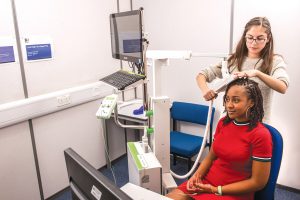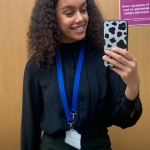 Produced by Guest blogger
Produced by Guest blogger
This is a guest blog from Cody Clarkson who studied MSc Investigative Forensic Psychology. Here she talks about what it was like to study at BU, how the course helped her to secure a job and her career aspirations.
My name is Cody and I graduated from the MSc course Investigative Forensic Psychology at Bournemouth University in November 2021. I have recently secured a job as Detective Constable with Humberside Police.
The main challenge I encountered throughout my year on this course was trying to juggle studies alongside full-time work. Although this proved challenging to begin with, I am now appreciative to have been faced with these circumstances because they prepared me for my current role as detective constable in which I am constantly balancing multiple tasks and responsibilities. A second challenge was undertaking this course at the peak of the coronavirus pandemic as this meant all learning was restricted to being online and we were unable to meet course mates or attend lecture theatres. The support of our lecturers on this course whilst facing a new way of learning amidst unprecedented times was phenomenal- they went above and beyond to ensure we had the extra academic and emotional support we needed and I could not praise or recommend a better group of lecturers enough. However for those studying on campus there are some great facilities including a crime scene training centre, mock courtrooms and psychology testing suites with the latest eye-tracking and face-processing equipment.
The components of this course are directly linked to my current job role, from learning about the types of serious crime and psychological theories underpinning these to professional skills and standards required in the court room. A third and equally as interesting unit includes the forensic implications of in Face-Processing which is another key element of policing. In particular, my favourite assignment undertaken during this course was writing an investigative report from a crime analyst perspective. Learning how to write a professional report proved to be extremely helpful during one of many interactive assessments for my job as D.C as I was able to apply the skills and structure I had acquired from the report writing assignment.
My plan for the future is to keep pushing to become the best D.C I can be and climb the ranking ladder in order to obtain more responsibility as helping others has always been central to who I am so being able to make changes on a large scale will be extremely rewarding.
My advice for prospective students interested in investigative forensic psychology is to take full advantage of such a fantastic opportunity with both hands; engage with guest lecturers and course mates and try to get ahead on assignments (contrary to how appealing procrastination may appear) as it is a tough course but it is worth every moment. In general, key pointers for joining the police would be to remain true to who you are: ask yourself what your motives to join are and think about what skills and attributes you possess which demonstrate your willingness and capability to be part of the police force. How could you make a change?



 Kelseigh and her career path to Detective Constable in the MET Police
Kelseigh and her career path to Detective Constable in the MET Police








